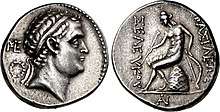Seleucus IV Philopator
Seleucus IV Philopator[1] (Greek: Σέλευκος Δ΄ Φιλοπάτωρ Selefkos Tetartos Filopator; c. 218 – 3 September 175 BC),[2][3] ruler of the Hellenistic Seleucid Empire, reigned from 187 BC to 175 BC over a realm consisting of Syria (now including Cilicia and Judea), Mesopotamia, Babylonia and Nearer Iran (Media and Persia).
| Seleucus IV Philopator | |
|---|---|
 | |
| Basileus of the Seleucid Empire | |
| Reign | 3 July 187 – 3 September 175 |
| Predecessor | Antiochus III the Great |
| Successor | Antiochus |
| Born | c. 218 BC |
| Died | 3 September 175 BC (aged 42–43) |
| Spouse | Laodice IV |
| Issue | Antiochus Demetrius I Soter Laodice V |
| Dynasty | Seleucid |
| Father | Antiochus III the Great |
| Mother | Laodice III |
Biography
Early years
He was the second son and successor of Antiochus III the Great and Laodice III. Seleucus IV wed his sister Laodice IV, by whom he had three children: two sons Antiochus, Demetrius I Soter and a daughter Laodice V. Seleucus was made co-ruler with his father, and acceded as sole Basileus upon Antiochus' death in 187 BC [4].
He was compelled by financial necessities, created in part by the heavy war-indemnity exacted by Rome in the Treaty of Apamea which concluded their war with the Seleucids in 188 BC, to pursue an ambitious policy. In an effort to collect money to pay the Romans, he sent his minister Heliodorus to Jerusalem to seize the Jewish temple treasury.
Taxes and assassination
The Bible tells of a prophecy given by a messenger angel in Daniel 11:20 (NLT). The text states that Seleucus "will be remembered as the king who sent a tax collector to maintain the royal splendor." The deuterocanonical lends more to this in 2 Maccabees 3:2-3... "It came to pass that even the kings themselves, and the princes esteemed the place [the Temple in Jerusalem] worthy of the highest honour, and glorified the temple with very great gifts: So that Seleucus king of Asia allowed out of his revenues all the charges belonging to the ministry of the sacrifices."
On his return from Jerusalem, Heliodorus assassinated Seleucus, and installed Seleucus' younger son Antiochus as king. The true heir Demetrius, son of Seleucus, was now being retained in Rome as a hostage, and the kingdom was seized by the younger brother of Seleucus, Antiochus IV Epiphanes. Antiochus managed to oust Heliodorus and co-ruled with the young Antiochus until 170 BC when he had him murdered.
Ancestry
| Ancestors of Seleucus IV Philopator | ||||||||||||||||||||||||||||||||||||||||||||||||||||||||||||||||||||||||||||||||||||||||||||||||||||||||||||||||||||||||||||||||||||||||||||||||||||||||||||||||||||||||||||||||||||||||||||||||||||||||||||||||||||||||||||||||||||||||||||||||||||||||||||||||||||||||||||||||||||||||||||||||||||||||||||||||||||||||||||||||||||||||||||||||||||||||||||||||||||||||||||||||||||||||||||||||||||||||||||||||||||||||||||||||||||||||||||||||||||||||||||||||||||||||||||||||||||||||||||||||||||||||||||||||||||||||||||||||||||||||||||||||||||||||||||||||||||||||||||||||||||||||||||||||
|---|---|---|---|---|---|---|---|---|---|---|---|---|---|---|---|---|---|---|---|---|---|---|---|---|---|---|---|---|---|---|---|---|---|---|---|---|---|---|---|---|---|---|---|---|---|---|---|---|---|---|---|---|---|---|---|---|---|---|---|---|---|---|---|---|---|---|---|---|---|---|---|---|---|---|---|---|---|---|---|---|---|---|---|---|---|---|---|---|---|---|---|---|---|---|---|---|---|---|---|---|---|---|---|---|---|---|---|---|---|---|---|---|---|---|---|---|---|---|---|---|---|---|---|---|---|---|---|---|---|---|---|---|---|---|---|---|---|---|---|---|---|---|---|---|---|---|---|---|---|---|---|---|---|---|---|---|---|---|---|---|---|---|---|---|---|---|---|---|---|---|---|---|---|---|---|---|---|---|---|---|---|---|---|---|---|---|---|---|---|---|---|---|---|---|---|---|---|---|---|---|---|---|---|---|---|---|---|---|---|---|---|---|---|---|---|---|---|---|---|---|---|---|---|---|---|---|---|---|---|---|---|---|---|---|---|---|---|---|---|---|---|---|---|---|---|---|---|---|---|---|---|---|---|---|---|---|---|---|---|---|---|---|---|---|---|---|---|---|---|---|---|---|---|---|---|---|---|---|---|---|---|---|---|---|---|---|---|---|---|---|---|---|---|---|---|---|---|---|---|---|---|---|---|---|---|---|---|---|---|---|---|---|---|---|---|---|---|---|---|---|---|---|---|---|---|---|---|---|---|---|---|---|---|---|---|---|---|---|---|---|---|---|---|---|---|---|---|---|---|---|---|---|---|---|---|---|---|---|---|---|---|---|---|---|---|---|---|---|---|---|---|---|---|---|---|---|---|---|---|---|---|---|---|---|---|---|---|---|---|---|---|---|---|---|---|---|---|---|---|---|---|---|---|---|---|---|---|---|---|---|---|---|---|---|---|---|---|---|---|---|---|---|---|---|---|---|---|---|---|---|---|---|---|---|---|---|---|---|---|---|---|---|---|---|---|---|---|---|---|---|---|---|---|---|---|---|---|---|---|---|---|---|---|---|---|---|---|---|---|---|---|---|---|---|---|---|---|---|---|---|---|---|---|---|---|---|---|---|---|---|---|---|---|---|---|---|---|---|---|---|---|---|---|---|---|---|---|---|---|---|---|---|---|---|---|---|---|---|---|---|---|---|---|---|---|---|---|---|---|---|---|---|---|---|---|---|---|---|---|---|---|---|---|---|---|---|---|---|---|---|---|---|---|---|---|---|---|---|---|---|---|---|---|---|---|---|---|---|---|---|---|---|---|---|---|---|
| ||||||||||||||||||||||||||||||||||||||||||||||||||||||||||||||||||||||||||||||||||||||||||||||||||||||||||||||||||||||||||||||||||||||||||||||||||||||||||||||||||||||||||||||||||||||||||||||||||||||||||||||||||||||||||||||||||||||||||||||||||||||||||||||||||||||||||||||||||||||||||||||||||||||||||||||||||||||||||||||||||||||||||||||||||||||||||||||||||||||||||||||||||||||||||||||||||||||||||||||||||||||||||||||||||||||||||||||||||||||||||||||||||||||||||||||||||||||||||||||||||||||||||||||||||||||||||||||||||||||||||||||||||||||||||||||||||||||||||||||||||||||||||||||||
Footnotes
- http://www.wordnik.com/words/philopator
- "Seleucus IV Philopator". Livius.org.
- Encyclopædia Britannica, Vol. 20 (1973), p. 190
- Grainger, "The Fall of the Seleucid Empire," Page 2.
- Laodice III, prior to her marriage to Antiochus III the Great, was a Princess of Pontus and was styled as such.
External links
| Wikimedia Commons has media related to Seleucus IV. |
- Seleucus IV Philopator entry in historical sourcebook by Mahlon H. Smith
Seleucus IV Philopator Born: Unknown Died: 175 BC | ||
| Preceded by Antiochus III the Great |
Seleucid King (King of Syria) 187–175 BC |
Succeeded by Antiochus |